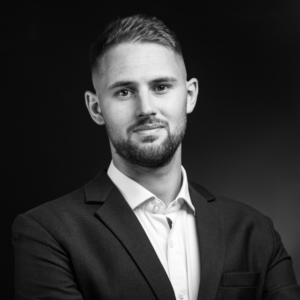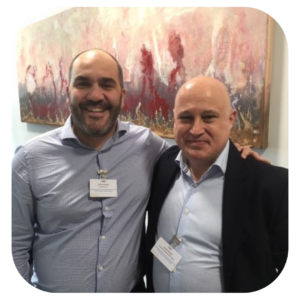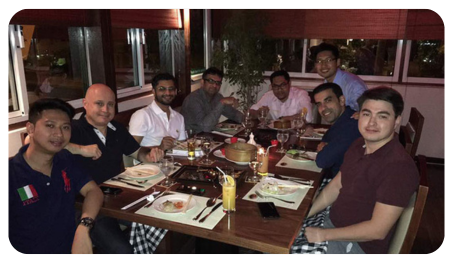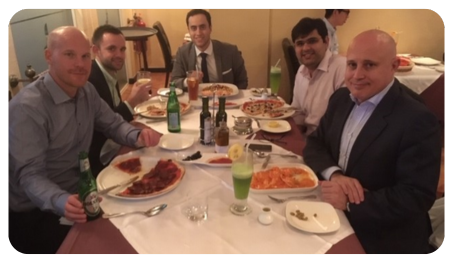Harvey John
Unit 2 Ferry Wharf
Hove Enterprise Centre
Basin Road North
Portslade, East Sussex
BN41 1BD
dfTime and time again, we’re asked by junior candidates what it takes to reach the senior grades within the indirect tax world. Rather than giving you our answer, we thought it would be best if we spoke to those who have been there and done it!
Having spoken with Jesús Ricart on numerous occasions, it seemed necessary to learn more about his journey into his current role and what he did to line himself up for success!
Jesús, it’s a pleasure to have you as a part of our ‘Becoming’ series. So, let’s get started with your story, where does it start?
After completing my studies in law and my Master’s Degree in business in Spain, my professional career in tax started in Barcelona in 1993 when I was offered a junior position in Price Waterhouse (PwC came around in July 1998 after the merger with Coopers & Lybrand). I initially worked as a tax generalist dealing with corporate tax and personal taxes and eventually transitioned into working more VAT projects.
Years later, it was at KPMG that I could start to develop a more focused indirect tax background. I worked for KPMG in Spain for 12 years which gave me the chance to deal with interesting VAT advisory and implementation projects. It was an amazing period of my career where I grew professionally and I developed a wide network of contacts not only in KPMG Global Indirect Tax services but also in other disciplines of the firm and in the market.
Over the years, I’ve had multiple opportunities to take over responsibilities for developing KPMG’s indirect tax capabilities in Latin America. This naturally moved me to Mexico City, where I lived for around 6 years, which gave me more focus and dedication towards local businesses and clients around the region.
In 2017, I decided to pursue a new direction in my professional career – the implementation of VAT in the countries of the GCC. I relocated to Bahrain with my family and initially worked at Deloitte. It was late 2017 when I moved to Yusuf Bin Ahmed Kanoo Group, a Regional Multinational Business conglomerate that currently focuses its work derived from the implementation of VAT in the UAE, the Kingdom of Saudi Arabia and Bahrain.
That’s nothing short of an adventure, especially from working in the LATAM regions to the GCC! What’s life like working abroad for a big multinational?
Working in a multinational firm gives you exposure to amazing projects working along with excellent people from different practices and countries. Thanks to the type of companies I work with and advise, I’m exposed daily to quite interesting VAT and tax technology developments. I also spend a lot of my time working in multiple jurisdictions and I regularly get the chance to meet different and interesting people.
I think exposure is quite easily a key element to development. Was there a particular aspect of your work that put you in a position to become a Director of Indirect Tax?
I like to define myself as a passionate VAT professional. Unlike my ‘Becoming‘ predecessors, I realized that I wanted to be an indirect tax specialist from the earliest stage of my career. I remember quite well when, many years ago, I worked on implementation projects in EU VAT and transfer tax principles coming from the European Court of Justice in tax litigation cases with quite positive outcomes from the Spanish Courts.
Given the specific circumstances of the tax services market in Spain, this wasn’t an easy selection, as the possibilities I’d had in the local tax services market were limited to Big 4 firms and several law firms.
As I previously mentioned, it was KPMG that gave me the chance to work on indirect tax issues and be part of a global network of VAT practitioners. My involvement within a multinational setting, plus my willingness to actively seek knowledge, was a perfect marriage to help my professional progression. This fact determined the superseding steps of my professional career.
It’s interesting to see that you decided so early on in your career that you wanted to specialise. Would you say self-education was quite an important element of your growth?
When you work in a multinational environment you should invest in your professional development. I’ve had access to different training resources throughout the years from previous job functions and I’m active in getting additional training from online resources. I can say it’s been vital to my career growth!
In addition, I always find time to interact with internal and external colleagues to discuss VAT technical issues. I combine these discussions with different VAT and tax technology training sessions from the Big 4 firms or organizations like the Tax Executive Institute (TEI).
Considering you free up some time for daily education, do you tend to stick to a daily routine?
Every first day of the week, (in my case on Sundays) I establish my top priorities for the week. There are always meetings and conference calls that take place every week which require my attention. My key objective is to deal with the complex issues (that require your entire concentration) first before dedicating my time to other daily activities like meetings, conference calls, correspondence and other interactions with the business that are necessary on a day-to-day basis.
To be honest, it’s difficult talking about routine when you’re managing VAT issues for a multinational group with a diversified portfolio of business activities in a VAT Implementation environment. I tend to encounter daily unexpected and challenging matters that arise from within the business – especially during the VAT Implementation processes that are taking place in the GCC. Given the nature of our work, you live in an environment where flexibility is key and the word routine has disappeared from your vocabulary. I might define routine as thinking on your toes!
With great responsibility, comes a great ability to adjust (don’t think that’s an accurate proverb). Have you any words of wisdom and advice for young professionals in tax?
Curiosity about different indirect tax topics that impact a business and getting a deep and detailed understanding of the different business transactions of your company are good practices to maintain. It’s also critical to operating with an open mind as you might work both in a multidisciplinary and multicultural business environment where personal interaction capabilities are a key asset for being successful in any VAT advisory function.
As I mentioned above, curiosity combined with an eagerness to learn new technical or managerial topics and assume new challenges create possibilities for indirect tax practitioners to operate in different jurisdictions or regions.
What do you think of current developments in indirect tax?
We’re currently living in an extraordinary period of developments that are radically changing the way we understand the indirect tax function.
From a regulatory standpoint, local governments, regional, or even global initiatives like OECD, require more attention from indirect tax practitioners. Actions like BEPS or the future VAT treatment of a digital economy, the reform of the EU VAT system, the implementation of SLIM VAT systems in developing countries, or the adoption of mandatory e-invoicing or real-time reporting obligations by different tax authorities also need added focus from specialists.
On the other side, we are confronting the impact of embracing technology-enabled processes in our tax management initiatives. Both sets of changes are already transforming the indirect tax function and the management of consumption taxes within organizations for the future.
Per this new scenario, new tax practitioners should be prepared to acquire ‘hybrid profiles’ where tax technical skills should be paired with technology skills as they can test the tax integrity and quality of the information coming from systems.
This is a changing environment where future indirect tax practitioners should take the initiative using innovation skills and have a new integrated approach to tax management, in which their capabilities to build relationships and collaborate with other business stakeholders in the organization will be paramount.
Great piece of advice from a seasoned veteran! There is quite a trend being set with technological advancements. Would you say you have any career inspirations or professionals that you look up to?
During my professional career, I’ve been very lucky to meet a variety of inspirational people with different profiles. In the countries where I’ve worked, I met people who added value to me and helped my career development.
In the early stages of my career, I was inspired by people who had impressive tax technical knowledge and capabilities.
However, I later realized that people need to follow senior professionals who have a good track record and strong leadership skills. In the tax world, the real successful professionals are those who are capable of balancing their tax technical skills with other skills like networking, team-building or management capabilities.
One of the most rewarding things in my career has been learning from people who used to report to me. Some are working in diverse indirect tax positions around the world and they continue to inspire me.
Learning from your peers never hurts anyone. Thanks so much, Jesús for speaking with us. It was fantastic learning about your background and your journey into becoming an industry leader!
—
Are you at the senior level within Indirect Tax? If so, we’d love to hear about your experiences and share them with our global tax network.
Search our latest tax jobs here.
If you would like to see our company updates and industry insights, follow our LinkedIn page here.
Author

From boutiques to the Big 4, and start-ups to multinational corporations, Alex manages a diverse portfolio of clients worldwide which has enabled him to develop a vast global network of indirect tax and tax technology professionals in 40+ countries.




